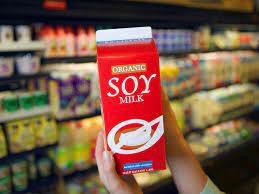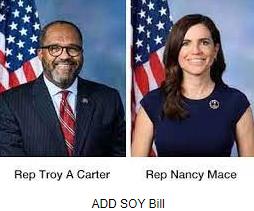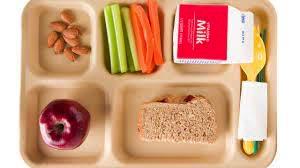 Legislation to promote soymilk as an alternative to dairy is being introduced into the Senate as S.2943 and into the House of Representatives as H.R.1619. The Addressing Digestive Distress in the Stomachs of Our Youth (ADD SOY) Bill requires public schools to offer soy milk to children participating in the National School Lunch Program. Currently the USDA imposes a specific mandate to serve cow’s milk. The USDA provides a reimbursement of $1 billion to school districts for serving cow’s milk representing an
Legislation to promote soymilk as an alternative to dairy is being introduced into the Senate as S.2943 and into the House of Representatives as H.R.1619. The Addressing Digestive Distress in the Stomachs of Our Youth (ADD SOY) Bill requires public schools to offer soy milk to children participating in the National School Lunch Program. Currently the USDA imposes a specific mandate to serve cow’s milk. The USDA provides a reimbursement of $1 billion to school districts for serving cow’s milk representing an  indirect subsidy to the dairy industry. Given the disinclination by children to drink whole milk based on taste preference or lactose intolerance close to 30 percent of the cartons served on each food tray are discarded. This is effectively an annual waste of $300 million in public funds. The question arises as to whether schoolchildren will actually drink soymilk even if not lactose intolerant. Perhaps soy and whole milk cartons should be offered as options to be picked up rather than being placed on trays. Non-selected cartons could be returned to refrigerators to be offered over consecutive days until expiry. Cafeteria managers could then manage inventory to avoid wastage.
indirect subsidy to the dairy industry. Given the disinclination by children to drink whole milk based on taste preference or lactose intolerance close to 30 percent of the cartons served on each food tray are discarded. This is effectively an annual waste of $300 million in public funds. The question arises as to whether schoolchildren will actually drink soymilk even if not lactose intolerant. Perhaps soy and whole milk cartons should be offered as options to be picked up rather than being placed on trays. Non-selected cartons could be returned to refrigerators to be offered over consecutive days until expiry. Cafeteria managers could then manage inventory to avoid wastage.

The proposed legislation may appear benign and beneficial. This does however create a precedent should a substitute egg product be developed in the future that is equivalent in nutritional value and cost to real eggs. Substitution would occur either by enactment or through promotion. Animal welfare groups ill-disposed to commercial egg production have made common cause with public health advocates concerned over childhood obesity to oppose serving of milk. The ADD SOY Bill has wide bipartisan support. Although benefitting soy growers the bill if enacted would be to the material disadvantage of dairy farmers who are rapidly losing markets.